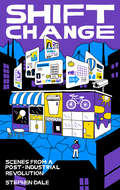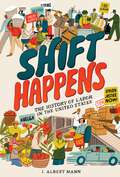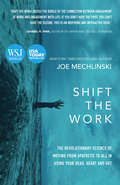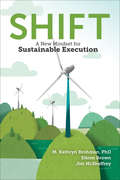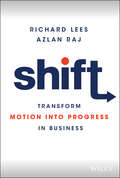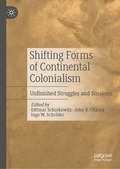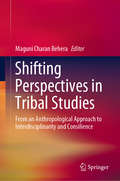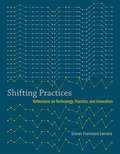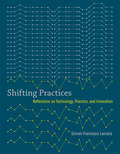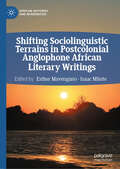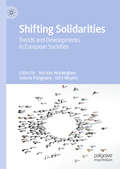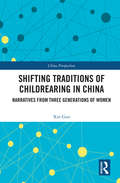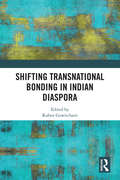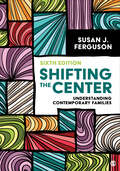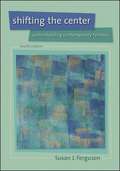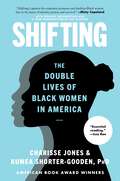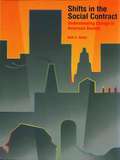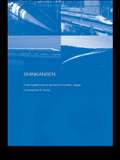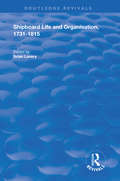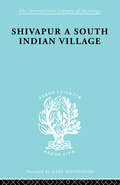- Table View
- List View
Shift Change: Scenes from a Post-industrial Revolution
by Stephen DaleHamilton’s industrial age is over. In the steel capital of Canada, there are no more skies lit red by foundries at sunset, no more traffic jams at shift change. Instead, an urban renaissance is taking shape. But who wins and who loses in the city’s not-too-distant future? Is it possible to lift a downtrodden, post-industrial city out of poverty in a way that benefits people across the social spectrum, not just a wealthy elite? In Shift Change, author Stephen Dale sets up “the Hammer” as a battlefield, a laboratory, a chessboard. As investors cash in on a real estate gold rush and the all-too-familiar wheels of gentrification begin to turn, there’s still a rare opportunity for both old-guard and newcomer Hamiltonians to come together and write a different story—one in which Steeltown becomes an economically diverse and inclusive urban centre for all. What plays out in these pages and at this very moment is a real-time case study that will capture the attention and the imagination of anyone interested in equitable redevelopment, housing activism, and social justice in the North American city.
Shift Happens: The History of Labor in the United States
by J. Albert MannFor readers of Stamped and An Indigenous Peoples’ History of the United States for Young People, Albert J. Mann’s Shift Happens: The History of Labor in the United States is an accessible and comprehensive YA history of the way the labor movement has shaped America and how it intersects with many of the major issues facing modern teens.“Mann explores the often oppressive, abusive, and bloody history of labor conditions and the merciless rise of capitalism with wit, snark, and comprehensive context.... Riveting, enlightening, infuriating, and timely: compulsory reading.” —Kirkus Reviews (starred review)"Its edgy title may attract attention, but it’s the compelling narrative and enlightening content that will keep readers engaged from cover to cover." —SLJ (starred review) "In other hands, the snarky, conversational tone might feel like an adult’s overreach, but Mann’s simmering anger and clear passion for the working class will inspire readers just as much as the union leaders and organization efforts she covers." —BCCB (starred review)“Mann’s introduction to the history of labor is full of sharp, galvanizing points that will keep readers engaged and help them look critically at some of our entrenched systems.” —ALA Booklist“The narrative’s laser focus on organizing heroes and essential employees, and the power of unions and striking workers to enact change, results in powerful storytelling.” —Publishers WeeklyYou need to work to live.That’s the truth for most people, and plenty of people in power have been abusing that truth for centuries.Long before the first labor unions were formed, workers still knew what exploitation looked like. It looked like the enslavement of Black people. It looked like generations of children dying in dangerous jobs. It looked like wealthy people hiring private militaries to attack their employees.But workers have always found a way to fight back. Lokono tribespeople resisted Columbus and his colonizers. Enslaved people led walkouts and rebellions. Textile workers demanded a wage that would let them have fun, not just survive. Miners died for the right to unionize. From 30,000 young seamstresses striking in the early 1900s to Uber drivers organizing for change today, people have learned we’re stronger when we are united.Shift Happens is a smart, funny, and engaging look at the history of the worker actions that brought us weekends, pay equality, desegregation, an end to child labor, and so much more.
Shift the Work: The Revolutionary Science of Moving From Apathetic to All in Using Your Head, Heart and Gut
by Joe Mechlinski70% of the American workforce is disengaged.With every tick of the clock, millions of people inch closer to their breaking points—a growing epidemic of apathy and anxiety in the workplace that is affecting life outside of the office. But meaningful work-life integration is possible.In Shift the Work, Joe Mechlinski, the New York Times bestselling author of Grow Regardless, shares his personal journey to find purpose, and how it influenced him to take a deeper dive into the science of human behavior. Inspired by neuroscience research about the connections between the brains in the head, heart, and gut that drive human perspectives and conduct, Joe shares how everyone can re-engage with their work and impact the world.Filled with actionable strategies and inspiring true stories, this indispensable guide motivates readers to seek fulfilling opportunities, reconnect with their passions, and recognize their power to make a difference.
Shift: A New Mindset for Sustainable Execution
by M. Kathryn Brohman Eileen Brown Jim McSheffreyOrganizations all too often create impressive strategies but fail at implementing them. Based on research with over 750 organizations, SHIFT conceptualizes execution with energy management in mind to offer discrete capabilitie that will help leaders "shift" into more sustainable and dynamic execution practices. With the importance of orchestrating balance between stability and flexibility at the core, SHIFT is written in four parts - identifying execution barriers, filling gaps, removing distractions, and differentiating execution leaders that are capable of driving improvement. Most novel is the introduction of a performance indicator, called the Cost of Execution (COx), that quantifies execution capabilities and challenges. SHIFT includes real case studies and describes a comprehensive approach that will help organizations satisfy the business demands of today and adapt to embrace the challenges of tomorrow.
Shift: Transform Motion into Progress in Business
by Richard Lees Azlan RajUnderstand what’s required to deliver top-of-the-line customer experiences As organizations around the world do their best to deliver meaningful, effective, and efficient customer experiences, many are encountering difficulty translating their actions into progress. These businesses find that, despite a plethora of initiatives, programs, and plans, inclusive and excellent customer service remains stubbornly out of reach. In Shift: Transform Motion into Progress in Business, Chief Strategy and Marketing Officers at Merkle and dentsu offer business leaders a practical and coherent approach to creating the consistently exceptional customer experience that would set their business apart from the competition. The authors link three key themes—a clear vision with clear performance indicators, an aligned team, and a deep understanding of the marketplace—and outline their importance in the quest for the ideal client experience. They explain the importance of measuring progress through the eyes of the customer and ensuring that the measures that matter to customers are improving. A necessary addition to the reading lists of innovation and business development professionals, Shift deserves a place on the bookshelves of managers, executives, and other business leaders attempting to set their organization apart from the competition.
Shifting Forms of Continental Colonialism: Unfinished Struggles and Tensions
by Dittmar Schorkowitz John R. Chávez Ingo W. SchröderThis book explores shifting forms of continental colonialism in Asia, Africa, Europe, and the Americas, from the early modern period to the present. It offers an interdisciplinary approach bringing together historians, anthropologists, and sociologists to contribute to a critical historical anthropology of colonialism. Though focused on the modern era, the volume illustrates that the colonial paradigm is a framework of theories and concepts that can be applied globally and deeply into the past. The chapters engage with a wide range of topics and disciplinary approaches from the theoretical to the empirical, deepening our understanding of under-researched areas of colonial studies and providing a cutting edge contribution to the study of continental and internal colonialism for all those interested in the global impact of colonialism on continents.
Shifting Perspectives in Tribal Studies: From an Anthropological Approach to Interdisciplinarity and Consilience
by Maguni Charan BeheraThis book brings together multidisciplinarity, desirability and possibility of consilience of borderline studies which are topically diverse and methodologically innovative. It includes contemporary tribal issues within anthropology and other disciplines. In addition, the chapters underline the analytical sophistication, theoretical soundness and empirical grounding in the area of emerging core perspectives in tribal studies. The volume alludes to the emergence of tribal studies as an independent academic discipline of its own rights. It offers the opportunity to consider the entire intellectual enterprise of understanding disciplinary and interdisciplinary dualism, to move beyond interdisciplinarity of the science-humanities divide and to conceptualise a core of theoretical perspectives in tribal studies. The book proves an indispensable reference point for those interested in studying tribes in general and who are engaged in the process of developing tribal studies as a discipline in particular.
Shifting Practices: Reflections on Technology, Practice, and Innovation
by Giovan Francesco LanzaraWhat happens in an established practice or work setting when a novel artifact or tool for doing work changes the familiar work routines? Any unexpected event, or change, or technological innovation creates a discontinuity; organizations and individuals must reframe taken-for-granted assumptions and practices and reposition themselves. To study innovation as a phenomenon, then, we must search for situations of discontinuity and rupture and explore them in depth. In Shifting Practices, Giovan Francesco Lanzara does just that, and discovers that disruptions and discontinuities caused by the introduction of new technologies often reveal aspects of practice not previously observed.After discussing methodological and research issues, Lanzara presents two in-depth studies focusing on processes of design and innovation in two different practice settings: music education and criminal justice. In the first, he works with the music department of a major American university to develop Music LOGO, a computer system that allows students to explore musical structures with simple, composition-like exercises and experiments. In the second, he works with the Italian court system in the design and use of video technology for criminal trials. In both cases, drawing on anecdotes and examples as well as theory and analysis, he traces the new systems from design through implementation and adoption. Finally, Lanzara considers the researcher's role, and the relationship -- encompassing empathy, vulnerability, and temporality -- between the reflective researcher and actors in the practice setting.
Shifting Practices: Reflections on Technology, Practice, and Innovation (Acting with Technology)
by Giovan Francesco LanzaraHow disruptions and discontinuities caused by the introduction of new technologies often reveal aspects of practice not previously observed.What happens in an established practice or work setting when a novel artifact or tool for doing work changes the familiar work routines? Any unexpected event, or change, or technological innovation creates a discontinuity; organizations and individuals must reframe taken-for-granted assumptions and practices and reposition themselves. To study innovation as a phenomenon, then, we must search for situations of discontinuity and rupture and explore them in depth. In Shifting Practices, Giovan Francesco Lanzara does just that, and discovers that disruptions and discontinuities caused by the introduction of new technologies often reveal aspects of practice not previously observed.After discussing methodological and research issues, Lanzara presents two in-depth studies focusing on processes of design and innovation in two different practice settings: music education and criminal justice. In the first, he works with the music department of a major American university to develop Music LOGO, a computer system that allows students to explore musical structures with simple, composition-like exercises and experiments. In the second, he works with the Italian court system in the design and use of video technology for criminal trials. In both cases, drawing on anecdotes and examples as well as theory and analysis, he traces the new systems from design through implementation and adoption. Finally, Lanzara considers the researcher's role, and the relationship—encompassing empathy, vulnerability, and temporality—between the reflective researcher and actors in the practice setting.
Shifting Sociolinguistic Terrains in Postcolonial Anglophone African Literary Writings (African Histories and Modernities)
by Isaac Mhute Esther MavenganoThis ground-breaking book focuses on the dynamic interplay between language and identity in postcolonial Anglophone African literature. It examines how African writers navigate and reshape linguistic/literary landscapes to articulate unique cultural experiences and resist neo-colonial legacies. The authors highlight the dynamics of sociolinguistic and cultural ecologies in the ever-evolving 21st century African and postcolonial contexts, and shed light on conceptions of African identities and humanity. The book contributes to postcolonial discourses and suggests new ways of reading changing textual practices, as well as providing important sites to rebuke differentiation politics at play between the Global South and North. The volume also illuminates intertextual conversations that will be insightful for other disciplines in the humanities. It will function as an important reference for scholars and students of languages, communication and media, Global South literatures, postcolonial African literary and cultural studies, and African philosophies and concepts. Whether one is an academic or a curious reader, this book promises to offer compelling insights and fascinating narratives that together enrich present-day understanding of the vibrant and evolving world of Anglophone African literature.
Shifting Solidarities: Trends and Developments in European Societies
by Ine Van Hoyweghen Valeria Pulignano Gert MeyersShifting Solidarities offers a comprehensive analysis of solidarity at a time when major social transformations have penetrated the heart of European societies, disrupting markets and labour relations, transforming social practices, and affecting the moral infrastructure of European welfare states. Factors such as the economic crisis, migration, digitalisation, and climate change all contribute to a sense of emergency. This volume considers how, in times of crisis, there are calls for solidarity by various new social and political actors and movements. The contributions present a broad array of empirical work and critical scholarship, zooming in on shifting solidarities in various domains of social life, including work, social policy, health care, religion, family, gender and migration. This compelling volume provides a unique resource for understanding solidarity in contemporary Europe, and will be a vital text for students and scholars across sociology, social policy, cultural studies, employment/labour markets and organisation studies, migration studies and European studies.
Shifting Traditions of Childrearing in China: Narratives from Three Generations of Women (China Perspectives)
by Xin GuoUnique in its intergenerational approach to understanding motherhood in China, this book sets out to study Chinese mothers’ experiences of childrearing, emphasising that gender is not immutable and that motherhood is not isolated from other social domains. The author adopts an historical and sociological design with a case study approach to investigate three living generations of women from 12 families of varied social-economic backgrounds in China. By comparing three aspects of these mothers’ lives – namely the growing-up experiences, mothering experiences and intergenerational transmission between mothers and daughters – this research provides an invaluable opportunity to ‘observe’ how changing structural elements shaped mothers’ varied subjectivities similarly or differently. It also addresses the continuities of the women’s experiences, highlighting the gendered and devalued roles in childcare that existed across three generations, reflecting the complex dynamic relationship between women’s agency and China’s social structures. This is an essential read for researchers, students, professionals and practitioners in the fields of sociology of families, childhood and education, gender studies, motherhood/parenthood studies, narrative studies, social policy and development studies.
Shifting Transnational Bonding in Indian Diaspora
by Ruben GowricharnThis volume examines Indian diasporic communities in various countries including the United Kingdom, Trinidad, Portugal, Netherlands, and Fiji, among others, and presents new perspectives on the shifting nature of Indian transnationalism. The book: Discusses how migrant communities reinforce the diaspora and retain a group identity, while at the same time maintaining a bond with their homelands; Highlights new tendencies in the configuration of Indian transnationalism, especially cultural entanglements with the host countries and the differentiation of homelands; Studies forces affecting bonding among these communities such as global and local encounters, glocalisation, as well as economic, political, and cultural changes within the Indian state and the wider Indian diaspora. Featuring a diverse collection of essays rooted in robust fieldwork, this volume will be of great importance for students and researchers of diaspora studies, globalization and transnational migration, cultural studies, minority studies, sociology, political studies, international relations, and South Asian studies.
Shifting the Center: Understanding Contemporary Families
by Susan J. FergusonShifting the Center: Understanding Contemporary Families, Sixth Edition is a popular anthology of readings used in Sociology of Family and of Marriages/Families/Intimate Relationship courses. Editor Susan J. Ferguson brings together carefully selected pieces written by leading family researchers and drawn from a variety of scholarly sources, including articles from the leading family journals and excerpts from several classic book-length studies. She also provides background and context to help students connect the topics in the readings to the broader themes in the study of family sociology. The table of contents follows the same scope and sequence as the leading family survey texts.
Shifting the Center: Understanding Contemporary Families
by Susan J. FergusonShifting the Center: Understanding Contemporary Families, Sixth Edition is a popular anthology of readings used in Sociology of Family and of Marriages/Families/Intimate Relationship courses. Editor Susan J. Ferguson brings together carefully selected pieces written by leading family researchers and drawn from a variety of scholarly sources, including articles from the leading family journals and excerpts from several classic book-length studies. She also provides background and context to help students connect the topics in the readings to the broader themes in the study of family sociology. The table of contents follows the same scope and sequence as the leading family survey texts.
Shifting the Center: Understanding Contemporary Families (Fourth Edition)
by Susan J FergusonThis anthology explores the issues and diversity of contemporary families, presenting balanced coverage of racial and ethnic variation and discussing a wide variety of family arrangements and processes. 32 out of the 50 selections included are new to this edition.
Shifting: The Double Lives of Black Women in America
by Kumea Shorter-Gooden Ms. Charisse JonesCommemorating its 20th year in print with a new Introduction and updated content, Shifting explores the many identities Black women must adopt in various spaces to succeed in America. Based on the African American Women's Voices Project, Shifting reveals that a large number of Black women feel pressure to compromise their true selves as they navigate America's racial and gender bigotry. Black women "shift" by altering the expectations they have for themselves or their outer appearance. They modify their speech. They shift "white" as they head to work in the morning and "Black" as they come back home each night. They shift inward, internalizing the searing pain of the negative stereotypes that they encounter daily. And sometimes they shift by fighting back. In commemoration of its twentieth year in print with a new Introduction and updated content throughout Shifting is a much-needed, clear, and comprehensive portrait of the reality of Black women's lives today.
Shifts in the Social Contract: Understanding Change in American Society
by Dr Beth A. RubinExamining the changes in society in the United States, Beth Rubin explains how the current era differs fundamentally from the post-World War Two period; how and why that change has occurred; and what its meaning is to everyday life. She traces the changes from a domestic to a global economy, the transformation of the workplace, and the impact that these changes have had on how other people are experiencing social aspects of their lives: their families and interpersonal relations, their communities and their experience of the culture of mass society.
Shinkansen: From Bullet Train to Symbol of Modern Japan (Routledge Contemporary Japan Series)
by Christopher HoodThe image of the shinkansen – or ‘bullet train’ – passing Mount Fuji is one of the most renowned images of modern Japan. Yet, despite its international reputation for speed and punctuality, little is understood about what makes it work so well and what its impact is. This is a comprehensive account of the history of the shinkansen, from its planning during the Pacific War, to its launch in 1964 and subsequent development. It goes on to analyze the reasons behind the bullet train’s success, and demonstrates how it went from being simply a high-speed rail network to attaining the status of iconic national symbol. It considers the shinkansen’s relationship with national and regional politics and economic development, its financial viability, the environmental challenges it must cope with, and the ways in which it reflects and influences important aspects of Japanese society. It concludes by considering whether the bullet train can be successful in other countries developing high-speed railways. Overall, this book provides a thorough examination of the phenomenon of the shinkansen, and its relationship with Japanese society.
Shiny Objects: Why We Spend Money We Don't Have in Search of Happiness We Can't Buy
by James A. RobertsIn Shiny Objects, a cross between In Praise of Slowness and The Tipping Point, consumer behavior expert Professor James A. Roberts takes us on a tour of America's obsession with consumerism—pointing out its symptoms, diagnosing specific problems, and offering a series of groundbreaking solutions.Roberts gives practical advice for how to correct the materialistic trends in our lives which lock us into a cycle of financial hardship and stress. Shiny Objects, a new The Paradox of Choice for the modern reader, is more than a critique of capitalism—it's also an exploration into how we can live happier, fuller, more productive lives today.
Shipboard Life and Organisation, 1731-1815 (Routledge Revivals Ser.)
by Brian LaveryThe idea behind this volume, according to its editor Brian Lavery, was to give a rounded picture of life at sea during the age of sail. It concentrates on the daily routine of shipboard life rather than more dramatic events such as battles and mutiny. It supplements other volumes produced by the Navy Records Society, notably Five Naval Journals 1789-1817 (vol 91, 1951, ed H G Thursfield) and The Health of Seamen (vol 107, 1965, ed C C Lloyd.)The selection begins in the second quarter of the eighteenth century because, stated Brian Lavery, ‘there are no suitable documents from earlier periods’ and closes in 1815, when the navy entered a new era with the advent of steam and a long period of peace.One of the most important aspects of shipboard life was that it was intensely self-contained, especially in the later part of the age of sail. After the conquest of scurvy, ships were able to stay at sea for many months at a time and the world-wide battle for empire caused them to make very long voyages, often away from their home bases over a period of years. Even in port seamen often stayed on board and shore leave was not in any sense a right. This volume throws a spotlight on the way in which a crew of up to 850 men could be crammed into a small space for many months at a time, and the ways in which they were fed, clothed, allocated space for eating and sleeping, at the same time as they were organised for sailing and battle duties.It contains separate sections dealing with Admiralty Regulations, Captain’s Orders, Medical Journals, discipline and punishment. It also includes an extensive glossary of the nautical terms and descriptions of the time.
Shipboard Life and Organisation, 1731-1815 (Routledge Revivals)
by Brian LaveryFirst published in 1998, this volume explores the Royal Navy which had most of its greatest triumphs in the decades up to 1815, but has received relatively little study of its social life and shipboard administration, beyond popular myth and sensational accounts. This volume starts with the formal structure of naval discipline, with Admiralty instructions and captains' orderbooks. It then looks at how things really happened, using diaries, medical journals, petitions, court martial reports and even the menu book of a semi-literate steward. It reveals many strong characters and colourful incidents of shipboard life, while providing material for study.
Ships without a Shore: America's Undernurtured Children (Ships Without A Shore Ser.)
by Anne PierceChildhood in America has changed, and not for the better. From day care for babies, to the exhausting array of activities for children, to the storm of lurid and violent shows now deemed appropriate for the young, to the expectation that teenagers build resumes, childhood has been thoroughly redefined. Anne R. Pierce argues that this radical re-definition has been embraced with remarkably little discussion about what children, by nature, need. Pierce submits that we have latched onto opinions about childrearing that are potentially harmful to children. If traditions are choices to be embraced or abandoned at our discretion, and adult self-fulfillment is a primary determinant in those choices, the fundamentals of the well-wrought childhood are easily forgotten. Steeped in intellectual permissiveness, we have convinced ourselves that parental substitutes are as good as parents themselves at caring for children, that the concepts of nurture and of the maternal are archaic and irrelevant, that more lessons and sports are better than less and that the earlier one embarks upon them the better, and that innocence and knowledge are less important than worldly attitudes and competitive skills. Understanding and challenging the theories and agendas behind childrearing trends is a pressing need, and the subject of this book. Pierce takes an honest look at the evidence on the effects of daycare and of hyper-structuring children. She gives voice to the many intelligent and estimable educators, child-development experts, researchers, and social commentators who are ignored because their conclusions are hard to bear. Equally important, Pierce says, is attention to that inner tug of love and conscience, which many of us have been programmed to ignore.Modern American children are expected to adjust and to understand as adults would the complexities and vicissitudes of public as opposed to private life. For them, childhood is fast becoming a distant memory. Could it be that America's thrust forward leaves children without a solid foundation upon which to grow? This is the sobering question asked, and answered, in this challenging book.
Shitstorms, Lügen, Sex: Steinzeitrituale in Gruppen und Hierarchien
by Gerhard SchwarzIst es Ihnen auch schon passiert, dass Sie im Aufzug auf den Knopf für das siebte Stockwerk gedrückt hatten, aber im fünften Stockwerk ausstiegen, weil alle anderen ausstiegen? Sie fahren nur dann weiter, wenn Sie diesen unbewussten Drang überwinden und sich mithilfe Ihrer Vernunft überlegen, dass Sie eigentlich in das siebente Stockwerk wollen. Der Drang, mit den anderen zusammen auszusteigen, ist ein archaisches Muster, das einstmals in der Steinzeit den Sinn hatte (und meist bis heute noch hat), in einer Gruppe, zu der Sie immerhin vom Erdgeschoss bis zum fünften Stockwerk gehörten, ein einheitliches Verhalten herzustellen. Gruppen, die diesen Konformitätsdruck nicht entwickeln, haben geringere Erfolgschancen als solche, denen es gelingt, ihre Mitglieder „gleichzuschalten“. Sigmund Freud nannte vor 100 Jahren diesen Drang des Individuums, Gruppenverhalten nachzuahmen „unbewusst“. Die moderne Gehirnforschung gibt ihm weitgehend recht. Auch die Gruppendynamik erkennt immer mehr solcher unbewussten Verhaltensmuster, die plötzlich in Gruppen auftreten und meist alle Mitglieder der Gruppe mit einbeziehen. Eine Gruppe kann sich dann auch ganz „irrational“ verhalten und Handlungen setzen, die ihr später – wieder bei vollem Bewusstsein – leidtun. Denn Gruppen – und nicht nur sie – verhalten sich nicht immer rational. Unter bestimmten Bedingungen geht die Vernunft verloren und es greifen archaische Muster. Die Psychologie verwendet dafür das Wort „Regression“, was eigentlich „Rückfall“ bedeutet. Aber wohin fallen wir zurück?Videos per App: Laden Sie die Springer Nature More Media kostenlos herunter - Abbildungen im Buch per App mit Handy oder Tablet scannen, um Videos zu streamen.
Shivapur: A South Indian Village (International Library of Sociology)
by K. IshwaranPublished in 1998, Shivapur: South Ind Vill LLs 71 is a valuable contribution to the field of Sociology & Social Policy.
